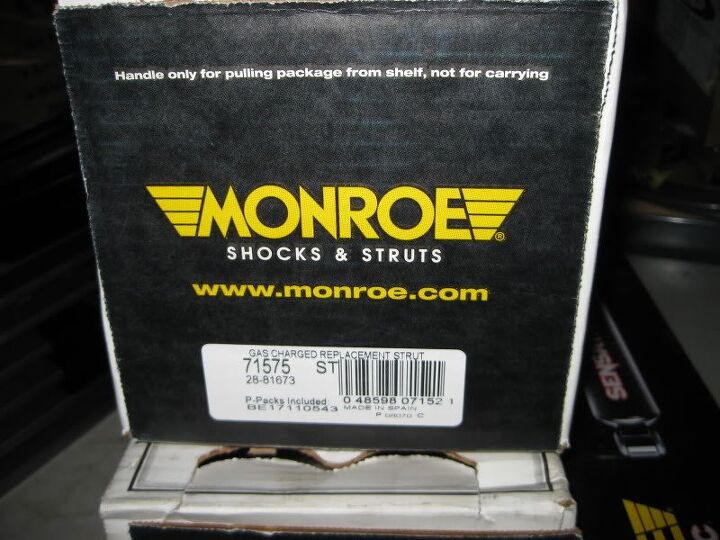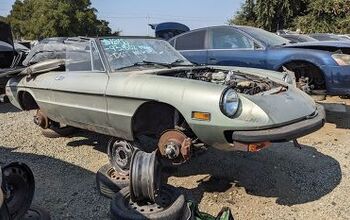Product Review: Monroe Shock Absorbers (Sensa-Trac and Max-Air)
In times like these, folks keep their cars longer (just ask Comrade Fidel’s oppressed masses of loyal subjects). Unfortunately, faster-spinning odometers have the nasty side effect of more quickly chewing up your car’s normal wear items. Some of these components (like brakes) can get downright demanding as they die. Others, like shock absorbers and their MacPherson strut cousins, just blend into the woodwork and stay there. Much like the guy in your high school yearbook that you can’t remember, your vehicle’s shocks and/or struts get Rodney Dangerfield-levels of respect and even less attention. Symptoms of worn shocks or struts include excessive floating after traversing even small bumps in the road, greater-than-normal body roll during cornering, increased braking distance, and extreme front end dive under moderate-to-hard braking.
Having experienced all of the above in larger quantities than is acceptable even for a 2001 Mercury Grand Marquis (a GS model, no factory air suspension), I decided my OEM shocks should call it a day after 168,749 miles of absolutely mediocre service. Bilsteins not being my thing, I immediately hopped online and ordered the extremely vanilla Monroe Sensa-Trac front gas shocks (to replace the oil-filled originals) and Monroe Max-Air rear air shocks (to replace the original gas-charged rears). Including shipping, my total came to $92.
Installation varies by vehicle; however, Monroe throws in everything you need, including reasonable facsimiles of all factory bushings, nuts, bolts and mounts. The rear air shocks come with a very concise, tri-lingual instruction sheet along with an installation kit that includes a tee-valve (to be located wherever in your trunk is convenient and safely-drillable), a barely adequate amount of air line, tiny O-rings for the air fittings, and a handful of mounting brackets. Everything but the shocks and the O-rings are plastic and feel extremely questionable. Also, would it have killed Monroe to spend two cents more per package and provide an additional foot (or three) of air line? Everything went together perfectly, though, and no trips to the parts store were necessary.
I wanted rear air shocks because I frequently pull a 2,000-pound utility trailer and hooking it up always caused the back of my big Merc to go for the limbo-dancing gold. Monroe claimed its Max-Air product was just the trick, with ride height-fixing pressure being easily adjustable from a stock-looking (and feeling) 20 PSI all the way up to a coil spring-bustin’, hip-hop-video-starring 140 PSI. (But avoid extended use above 90 PSI, Monroe says, implying, perhaps, that you should only go higher for occasional heavy loads or drive-by shootings.)
Ass-in-the-air antics aside, my new pneumatic nozzles never leaked and both front and rear shocks performed magnificently: Monroe took the OEM ride and handling specs and improved on them brilliantly.
Reduced body roll rivals my car’s P71 Police Interceptor cousin, but without the slightly harsher ride of that car’s stiffer springs and shocks. Jounce is minimized surprisingly, although this reduction doesn’t seem as affected by vehicle speed as Monroe’s “Road Sensing Technology” marketing materials claim. Rebound is similarly well-attenuated – it doesn’t make the car BMW-firm, but most traditional full-sized sedan customers aren’t looking for that, anyway. (Think “less float,” not “no float.”) Only in braking do these Monroes not best their costlier OEM competitors; however, they’re certainly no worse: Nose-dive under hard stopping still happens, but it’s no longer as dramatic.
Sealing the deal for my resounding endorsement was the miracle wrought in the trailer-hauling department. A very comfortable (if slightly rear-end elevating) 60 PSI kept the Mercury’s hindquarters completely level when attached to my five-by-eight band equipment hauler. But the real story came from behind the wheel, where the transformation was downright astonishing. The nagging yaw I’d taken for granted was gone, and the up-and-down pitching motion brought on by braking had similarly vanished. Each move the vehicle made when hitched was more positive than ever before; definitely better than with similar trailers I’ve pulled behind factory rear-air-suspension-equipped Panthers.
Bottom line: If you’re not a Bilstein-level load hauler or a Koni-loving corner-carver, and you own a fairly conventional ride that serves as basic, daily transportation (but you like it and don’t plan on trading), you would be hard-pressed to find a product more capable of providing such immediately-tangible ride and handling improvements while simultaneously doing the right thing for your vehicle’s suspension.
More by Don Gammill Jr.
Latest Car Reviews
Read moreLatest Product Reviews
Read moreRecent Comments
- Varezhka For this category my car of choice would be the CX-50. But between the two cars listed I’d select the RAV4 over CR-V. I’ve always preferred NA over small turbos and for hybrids THS’ longer history shows in its refinement.
- AZFelix I would suggest a variation on the 'fcuk, marry, kill' game using 'track, buy, lease' with three similar automotive selections.
- Formula m For the gas versions I like the Honda CRV. Haven’t driven the hybrids yet.
- SCE to AUX All that lift makes for an easy rollover of your $70k truck.
- SCE to AUX My son cross-shopped the RAV4 and Model Y, then bought the Y. To their surprise, they hated the RAV4.


































Comments
Join the conversation
kyb used to be a good product. now a poorly constructed, cheap product. the problem on the konis and billsteins are the limited applications and cost. Tokico has even less coverage. for the average consumer monroe has a good product at an affordable pricing structure. thats my take. from someone who has been installing them for 25 years.
I installed Monroe sensatrac shocks on my 1999 grand Marquis P/N 5993 front & 5960St rear on Mar 15, 2011 at 10142 miles. Now at 10452 miles on June 10, 2011 3 shocks are leaking & 4th doesn't seem to be holding up on controling bounce. Admittedly they will be replaced free under warranty but if they were made better I wouldn't have to go through this time wasting process. Anyone else had any similar bad luck with this product?